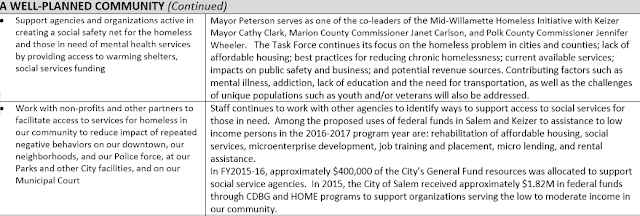Revised: December 2018
By Sarah Owens and Michael Livingston
In February [2016] we convened this Task Force with the idea that bringing people together in various areas of expertise and various areas of knowledge of need, we could better understand the need and could put together a network that would better meet those needs in a very practical way. So, we've been going over the background and scope of the problem, understanding best practices that have been put in place in other areas, such as Housing First. We've looked at the Continuum of Care. We've had different panels that have brought us some very, very valuable information about our housing and how to put together our strategic framework. [We've had] a very moving and deeply practical panel of veterans, we had a great panel on mental illness, disabilities, and law enforcement - the interface, again, working together to make sure law enforcement is part of the solution, part of that network in the Continuum of Care, getting people where they need to be to be successful in the long run.
The main event was a series of questions to a panel of "rental managers", consisting of Task Force member Kathleen Ashley (also secretary of the Salem Rental Housing Association and owner of Making Homes Happen, Inc.); Cathie Miles of Shelter Management, Inc., Nicole Utz of the Salem Housing Authority, and Valerie White, of Encompass Management and Consulting, Inc..
The first version of the agenda listed as panelists: Violet Wilson of V & R Management, LLC (single family and small multiplexes in Keizer); George Grabenhorst (Sperry Van Ness Commercial Advisors, LLC, and the Oregon Association of Realtors, formerly on the Marion County Planning Commission); Ronda Wymore (Communications Director of of Willamette Valley Multiple Listing Service) (expertise in technical administration and technical training); and Ashleigh Armenaki (broker with Windemere) and Hector L. Garcia (broker with John L. Scott), both of the Salem Association of Realtors (later Mid Valley Association of Realtors).
The questions were unsophisticated (e.g., why don't people pay rent?) and responses mostly patient, except after someone asked about "slumlords whose tenants end up needing additional assistance for health, heating, or other needs, [and] drain our [social services] resources." Our favorite exchange was when one of the panelists said she had commercial office space that could be converted to residential use, except that government regulations requiring sprinklers made it too expensive, prompting Commissioner Carlson to ask, "Sprinklers like a lawn?"
The panelists were asked to opine on tenant abuses relating to service and companion animals, the need for "no cause evictions" and whether housing was safe, sanitary and habitable just because the City said it was. Unfortunately, time ran out before they could discuss would-be tenants with criminal histories. (See HUD's recent guidance disfavoring the use of criminal background as an automatic disqualifier.)
The demo was Commissioner Carlson's idea. Apparently, she really does not like 211 Info because she could not "get it to work" and because it requires providers to keep their information current, which apparently they don't like to do. (In July 2017, Marion County revived its Community Resource Network (CRN), and, in September 2018, Northwest Human Services launched a web-based version of its Crisis and Information Hotline, called Mid Valley Resources (MVR).)
The Task Force did not hear Walter Reed, owner of Healthcare Business Education, Inc., who, according to the first version of the agenda, had been scheduled to talk about "GOODS Services" (GOODS stands for Greater Oregon Online Data Services), a "Human Services and Public Safety Resource Database" used by DHS and Marion County. Mr. Reed has been to several, if not all, meetings of the Task Force.
The Task Force returns in two months (summer break). Bruce Bailey has stopped attending meetings, and Mayor Peterson and Councilor Bednarz will be out of office by the end of the year. Commissioner Carlson has made clear she expects each committee to return in September with at least two recommendations, followed by another five to ten in October, each of which will have to be "explained", considered and voted on individually during the November and December meetings. This, she predicts, will "take a lot of time."



